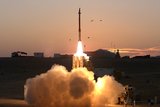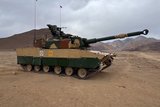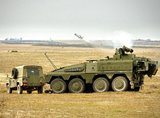Canada looking to expedite purchase of armoured fighting vehicle and a new tank
Canada is improving its Leopard main battle tank fleet but before this is fully completed, it is expected to begin looking for new vehicles.
The Latvia Ministry of Defence has placed an order for RBS 70 missiles with Saab, the company announced on 22 October.
The deliveries under the order, which is a part of Latvia’s long-term plan to further increase its air defense capabilities, are scheduled during 2015-2016. Under the contract, the company will deliver training, missiles and associated equipment. An option for additional orders in included.
Anna Fröjd, head of market area Nordic and Baltic, Saab, said: ‘The RBS 70 is a modern system with a long lifespan. We can see that an increasing number of customers are taking advantage of its flexible design, which allows for the system to be continuously upgraded and adapted to evolving needs.’
Raimonds Bergmanis, Latvian Minister of Defence, said: ‘Anti-missile defense is one of our main and strategic priorities in order to strengthen Latvia's defense and security. The agreement between Saab and the Ministry of Defence of Republic of Latvia will demonstrate excellent cooperation between Sweden and Latvia which builds trust and confidence with regard to the security in the region.’

Canada is improving its Leopard main battle tank fleet but before this is fully completed, it is expected to begin looking for new vehicles.

A surge in aerial threats – from advanced missiles to low-cost drones – is reshaping the way militaries approach air defence, driving demand for flexible, multi-layered solutions.

In a bid to accelerate delivery of the British Army’s Challenger 3 main battle tank, which has just carried out its first crewed firings with the latest Rheinmetall 120mm L55A1 smoothbore gun, the UK has opted for an unconventional approach.

Since signing a contract to purchase 54 M1A2 Abrams tanks last year, Romania has been looking into options to buy more tanks, but it could cast the net wider than Abrams with funding considerations potentially set to shape the outcome.

The Indian Army’s modernisation plans reflect the lessons learned from ongoing conflicts and threats as it continues its push for indigenous capabilities.

The Portuguese Army is undergoing an overhaul of its platforms with the latest move towards Boxer 8x8 vehicles marking a major step in reforming and modernising its brigades.